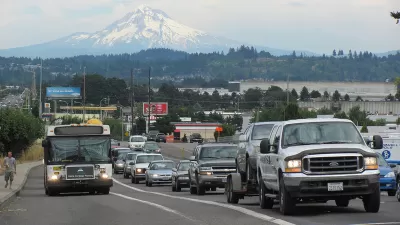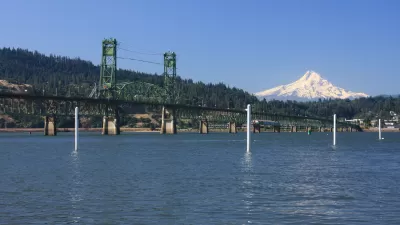Oregon is one of five states that has no sales tax, but that will change on January 1, with Gov. Kate Brown's signature on a landmark transportation funding bill that applies a half-cent sales tax to auto sales and increases gas taxes by 10 cents.
Democratic Gov. Kate Brown embarked on a two-day, statewide tour on Aug. 28 to promote the signing of landmark transportation funding package. The bill, HB 2017, includes a much-talked about bike tax, first in the nation; a 10-cents gas tax increase, and a 0.5 percent motor 'vehicle privilege' tax that funds a new Zero-Emission Incentive Fund to fund two rebate programs.
By relying on the privilege tax, the Electric Vehicle (EV) Rebate Program takes a much different funding approach than a controversial bill in California which uses cap-and-trade auction revenues paid by all major emission sources to supplement the existing California Clean Vehicle Rebate Project.
In some ways, the privilege tax takes a direct approach, unlike California, somewhat similar to a 'feebate" with the major exception that electric vehicles are also subject to the tax. In Norway, which has the highest market penetration per capita of electric vehicle sales, EVs are not subject to a sales tax of 25 percent nor a *registration tax.
Depending on the battery size, consumers who purchase an electric vehicle with a retail price less than $50,000 are eligible to receive a rebate up to $2,500, similar to the current California program.
The program goes further by establishing a "Charge Ahead Oregon Program" that establishes additional rebates up to $2,500 to low and moderate income residents who retire their high-emission vehicles and purchase new or used EVs.
The first $12 million annually of privilege tax revenue goes to the Zero-Emission Incentive Fund. Remaining funds are transferred to the Connect Oregon Fund, as are revenues from the $15 excise tax paid by those who purchase bicycles costing more $200 and with a wheel diameter of 26-inches or larger. Revenues from the bike tax are restricted to funding bicycle/pedestrian infrastructure
*For more elements of the comprehensive transportation package, see July post after HB 2017 passed the legislature. Note the EV registration fee, also described by Green Car Report's John Voelcker.
As for the four states where one can purchase motor vehicles and pay no sales taxes after January 1, they would be Montana, Alaska, New Hampshire and Delaware.
FULL STORY: Oregon Launches EV Rebates Funded by Auto Sales Tax

Study: Maui’s Plan to Convert Vacation Rentals to Long-Term Housing Could Cause Nearly $1 Billion Economic Loss
The plan would reduce visitor accommodation by 25,% resulting in 1,900 jobs lost.

North Texas Transit Leaders Tout Benefits of TOD for Growing Region
At a summit focused on transit-oriented development, policymakers discussed how North Texas’ expanded light rail system can serve as a tool for economic growth.

Using Old Oil and Gas Wells for Green Energy Storage
Penn State researchers have found that repurposing abandoned oil and gas wells for geothermal-assisted compressed-air energy storage can boost efficiency, reduce environmental risks, and support clean energy and job transitions.

Private Donations Propel Early Restoration of Palisades Playground
Los Angeles has secured over $1.3 million in private funding to restore the Pacific Palisades playground months ahead of schedule, creating a modern, accessible space that supports community healing after recent wildfires.

From Blight to Benefit: Early Results From California’s Equitable Cleanup Program
The Equitable Community Revitalization Grant (ECRG) program is reshaping brownfield redevelopment by prioritizing projects in low-income and environmental justice communities, emphasizing equity, transparency, and community benefits.

Planting Relief: Tackling Las Vegas Heat One Tree at a Time
Nevada Plants, a Las Vegas-based nonprofit, is combating the city’s extreme urban heat by giving away trees to residents in underserved neighborhoods, promoting shade, sustainability, and community health.
Urban Design for Planners 1: Software Tools
This six-course series explores essential urban design concepts using open source software and equips planners with the tools they need to participate fully in the urban design process.
Planning for Universal Design
Learn the tools for implementing Universal Design in planning regulations.
Ascent Environmental
Borough of Carlisle
Institute for Housing and Urban Development Studies (IHS)
City of Grandview
Harvard GSD Executive Education
Toledo-Lucas County Plan Commissions
Salt Lake City
NYU Wagner Graduate School of Public Service





























